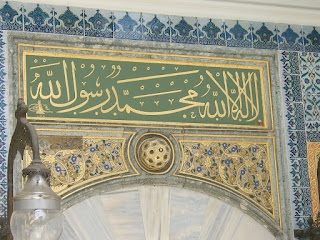 We took a four-day trip to Istanbul last weekend. I had earlier opportunities to visit Istanbul but never took the chance, mainly because I had no idea of the richness of its history and culture. Darbi, Diane, and I were there for only four days and packed every minute of it so that we could taste the contemporary culture as well as understand the history of this fascinating place. We did everything from visiting Topkapi to the Grand Bazaar to the Spice Bazaar to a boat outing up through the Bosphorous region (where the Sultans built their palaces after Topkapi no longer served its purpose) to the huge water storage Cistern under the ancient core of the city. We were welcomed by friendly and engaging people, tourists from all over the world, and absolutely beautiful weather!
We took a four-day trip to Istanbul last weekend. I had earlier opportunities to visit Istanbul but never took the chance, mainly because I had no idea of the richness of its history and culture. Darbi, Diane, and I were there for only four days and packed every minute of it so that we could taste the contemporary culture as well as understand the history of this fascinating place. We did everything from visiting Topkapi to the Grand Bazaar to the Spice Bazaar to a boat outing up through the Bosphorous region (where the Sultans built their palaces after Topkapi no longer served its purpose) to the huge water storage Cistern under the ancient core of the city. We were welcomed by friendly and engaging people, tourists from all over the world, and absolutely beautiful weather!The most fascinating thing about Istanbul is its history. It has been a crossroads for Europe and Asia for almost 5 millenia and the greatest jewel of all of Istanbul is the Istanbul Archeology Museum, a collection that covers the full 5,000 years. We were utterly amazed to see one of the most extensive collections of sculpture of anywhere in the world, including the Louvre in Paris. Most of this collection was drawn from the Ottoman Empire during the late 19th and early 20th centuries. The Ottoman Empire overlapped, and was a threat to, the Habsburg Empire. In fact, the prominence of the Habsburg family was probably largely the result of its ability to defend against Ottoman invasions of eastern Europe.
Besides the archeological collection, Topkapi also has the religious "relics" rooms (picture to right is of the entrance because I couldn't take pictures inside).
 We were utterly stunned to stand before relics like Moses' staff, Joseph's turban, Saint John's arm, and a number of other things. We were left wondering, "how could this be?" The sense of awe upon seeing such artifacts, reported to being the originals of the worlds greatest prophets, was utterly amazing.
We were utterly stunned to stand before relics like Moses' staff, Joseph's turban, Saint John's arm, and a number of other things. We were left wondering, "how could this be?" The sense of awe upon seeing such artifacts, reported to being the originals of the worlds greatest prophets, was utterly amazing.One of the most important architectural wonders is the Hagia Sophia, reportedly one of the seven wonders of the world. It was built in the 5th century to replace the original Christian church built on the same site by Constantine when he established Constantinople as the capital of the Holy Roman Empire (establishing Christianity as its religion). Constantine built the first church on this site which was destroyed in two subsequent uprisings. Artifacts of the earlier churches are strewn around the Hagia Sophia in gardens and ongoing archaeological digs. The Hagia Sophia pictured below is now in dire need of repair, although its former splendor is obvious beneath layers of stucco/decorated coverings. The golden mosaics emerge when the stucco is taken off, revealing the original Christian images that previously graced its walls and vaulted domes. When Islam took the church and converted it to a Mosque, all references to Christianity were removed or covered over. It now stands as a tribute to both religions, without being dedicated to the use of either.

We left Istanbul wanting to learn more and believing that we had a wonderful (and hopefully first) exploratory visit. Upon arrival back in Qatar and while unpacking from our journey, CNN broke the news of the terrorist blasts that killed 17 people and wounded many more a mere few miles from where we stayed in Istanbul. A very sad, sad sign of the strife that still exists among religious groups in Istanbul. Ultimately the PKK (the Kurdistan Workers' Party) was identified as responsible by the pro-secularist Republic People's Party, a claim rejected by the PKK. Knowledge of this violence causes hesitation to return to a place that seemed so welcoming and so enjoyable. Until global divisions and idealogical differences are accepted as normal and embraced as a necessary and useful part of the human condition, Istanbul and many of our other communities throughout the world will continue to be vulnerable to violence.